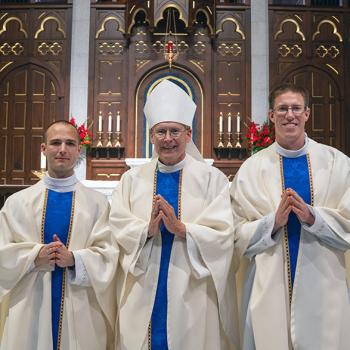As they contemplated in this manner, the old monks began to treat each other with extraordinary respect on the off chance that one of them might actually be the Messiah. And on the off, off chance that each monk himself might be the Messiah, they began to treat themselves with extraordinary respect.
Because the monastery was situated in a beautiful forest, it so happened that people occasionally came to visit the monastery to picnic on its tiny lawn, to wander along some of its paths, even now and then to go into the dilapidated chapel to meditate. And as they did so, without even being conscious of it, they sensed this aura of extraordinary respect that now began to surround the five old monks and seemed to radiate out from them and permeate the atmosphere of the place. There was something strangely attractive, even compelling, about it. Hardly knowing why, people began to come back to the monastery more frequently to picnic, to play, to pray. They began to bring their friends to show them this special place. And their friends brought their friends.
Then it happened that some of the younger men who came to visit the monastery started to talk more and more with the old monks. After a while one asked if he could join them. Then another. And another. And it happened that within a few years the monastery had once again become a thriving order and, thanks to the rabbi's gift, a vibrant center of light and spirit.
Rabbi Jeffrey draws this conclusion from the story: "How we judge and treat the people around us, on a simple day to day level, not only determines our relationship with them but the very quality of life in our community. Whether that community is the floor of a dorm, a culture house, an apartment, a sorority or fraternity, an organization, the administration or the faculty of the University, our small worlds can be transformed when we look at another human being and understand: this person has merit and worth. There are things I can learn from this person. The rabbis in the Mishna teach that we should judge every person, weighing in our judgment of them on the positive side of the scale. Indeed, in the rabbinic tradition, this approach to how we judge other people is seen as one of the definitions of wisdom: Who is the person who is wise? The one who has the ability to learn something from every person. A wise person is able to really hear and appreciate that every individual can make a valuable contribution to our life, to our community."
We can view Romans 14:1-12 as "The Rabbi's (Paul's) gift." It is the gift of respect for others in the context of service to the One who is the Lord of the dead and the living, the one before whom we will all stand one day, accountable for our own actions and inactions.
"For to this end Christ died and lived again, so that he might be Lord of both the dead and the living" (14:9). "If we live, we live to the Lord. If we die, we die to the Lord. Whether we live or whether we die, we are the Lord's" (14:8). We are all servants in the Lord's household.
Sources Consulted
Ernest Best, The Letter of Paul to the Romans: The Cambridge Bible Commentary on the New English Bible
Rabbi Jeffrey Summit, Neubauer Executive Director, Tufts Hill, Tufts University; "The Rabbi's Corner," September 25, 2004, "Judging Others, Judging Ourselves"





